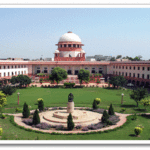Introduction
This small ambitious country is one of Central America’s more prosperous nations but it doesn’t appear that way even to a casual visitor. Under the glaze of business and industry are serious human rights abuses, especially against LGBT people. Here is a small portrait of life when one is gay, poor, and disenfranchised. However, there is a bright spot in the form of the LGBT organization, OASIS.
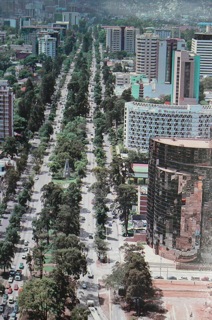
Also see: Gay Life in Antigua, Guatemala 2012
By Richard Ammon
GlobalGayz.com
To describe LGBT life in Guatemala is to describe a pretty parrot in a rusty cage, confined and fated to live a life of hindrance.
Different Lives
There are many ways to tell this story. I could begin in the high-rise luxury condos in Zone 10, south of the central Guatemala City where Hector and Ricardo live on the 15th floor in their polished three bedroom apartment with wide views over the smoggy city and distant volcanoes and mountains.
I could tell of their eight years together as a semi-closeted Guatemalan gay couple and their rarified lifestyle of private dinner parties (cooked and served by their domestic staff), European trips, their investment portfolio of real estate and off-shore bank accounts.
They don’t go downtown much, rather there are modern malls in their area and fine restaurants, mixed in with the embassies on leafy streets, private clubs and two of the city’s best museums. The Universidad of Francisco Marroquin is nearby.
But most gay people—or anyone—in Guatemala would hardly know what I was talking about. They could not imagine this gay couple as part of the ‘gay community’ in Guatemala City. Also see: Wealth in Guatemala
Life in the Streets
More recognizable would be the four young teen boys I saw on a gritty downtown street corner the other night. They could not have been over fourteen or fifteen, dressed in scruffy jeans with hand-me-down shirts from Hollister or Quicksilver.
I was riding with my host, Jorge Lopez, director of Oasis (Organización de Apoyo a una Sexualidad Integral frente al SIDA) LGBT organization, and I asked if these were ‘dangerous’ people, since it was nighttime and we were in a risky area where crime is a problem.
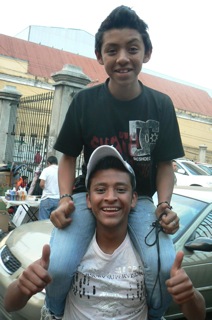 “No, they are just prostitutes looking for some action,” Jorge said in a matter-of-fact way, but not indifferently. “This is one of the problems we face with these young boys. They belong nowhere. They are gay and have probably been rejected from home and have no job skills so they turn to selling for sex.”
“No, they are just prostitutes looking for some action,” Jorge said in a matter-of-fact way, but not indifferently. “This is one of the problems we face with these young boys. They belong nowhere. They are gay and have probably been rejected from home and have no job skills so they turn to selling for sex.”
The legal age of consent in Guatemala is 18. That means for three or four years these temporarily cute street hustlers will put themselves at high risk in a dangerous lifestyle that is very distant from Hector and Ricardo’s. Indeed the economic disparity in Guatemala is stark with over 80% of the wealth controlled by 5% of the people.
We were stopped for a traffic light so I had a moment to observe them. Their faces were fresh; their eyes alert like hunted rabbits; their caps on backward trying to look the part of street-wise workers with an edge. I’d say they only partly succeeded. Suddenly one of them ran off to a car stopped nearby to talk business.
“Is that legal?” I asked foolishly. “No, of course not. But there is nothing we can do to help them much. The government provides no place for homeless kids. There are no social services, no training programs, no legal protections. They don’t care what happens to them. The police will only take them if there are drugs involved, and jail is much worse than the street. For sure they will be abused or raped and mentally tortured.”
It was obvious these kids were in a precarious limbo, with indifferent authorities, exploitive customers, rejecting families and in an impoverished state. Street boys would do anything asked of them (for about UD$2 an encounter), setting them up for HIV and other diseases, physical violence from sex trade gangs; sounds like jail except they are occasionally offered some support by Oasis volunteers.
Oasis Outreach
Under Jorge’s direction for the past 17 years, Oasis outreach staff has gone out to street workers, male, female and trans, to talk to them about better options such as real work, about safe sex and condom usage (given free), about their rights not to be abused or discriminated against.
They’re informed of Oasis’ location and programs for gay youth that offer them a new family and sincere friends. (At the time of my visit, Oasis was in the process of setting up a cooking training course in their office building for sex workers.)
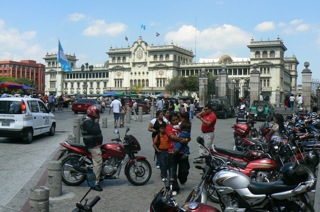 Unfortunately, as usual, only a few respond to the offers; sex is easier than manual labor, and the possibility of US$10 a day is appealing–@$2 per customer. (photo right, central square)
Unfortunately, as usual, only a few respond to the offers; sex is easier than manual labor, and the possibility of US$10 a day is appealing–@$2 per customer. (photo right, central square)
“They are so far down they don’t know what up means,’ said Vinicio Alvarado, the knowledgeable program director at Oasis. “They are hardly in the ‘gay community’. They have a couple of other hustler friends and they think it’s the best they can get.” They reminded me of feral cats whose lives sustain moment by moment with no thought of tomorrow or next week.
It’s a very sad tale of lowlife in Guatemala City. It is also sad to walk around the streets of this gritty city of three million whose inhabitants lead impoverished lives to one degree or another. They range from slightly prosperous fruit vendors in the public square making $5 a day (in front of the huge catholic cathedral with it gilded altars) to the 25-cent shoeshine guys (who use their fingers to apply the polish) to the disfigured cripples looking up from their twisted legs.
Being Gay
And if one is openly gay, life’s not much better in this aggressively homophobic country. Anyone who comes out of their machismo-surfaced closet runs major risks of damage ranging from murder to high discrimination—including at the universities where known gay students are given a hard time continuing their studies as faculty and staff refuse to cooperate on their behalf.
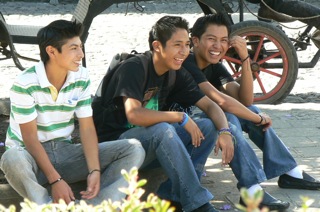 Vinicio noted that university students have positive status in the country but if they come out they lose that status. He also said that being rich brings high status and the privileged have rights (and impunity) like no one else. “Everybody is poor here–80% at least; 20% of them are extremely poor. Fewer than 10% have power; twelve families own Guatemala’s businesses and land.” I heard similar figures from a Habitat for Humanity presentation a week later.
Vinicio noted that university students have positive status in the country but if they come out they lose that status. He also said that being rich brings high status and the privileged have rights (and impunity) like no one else. “Everybody is poor here–80% at least; 20% of them are extremely poor. Fewer than 10% have power; twelve families own Guatemala’s businesses and land.” I heard similar figures from a Habitat for Humanity presentation a week later.
(photo left, middle class guys)
Fortunately enough, Vinicio did complete his university degree and went on to earn two advance health certifications including one specialized in HIV—a rarity for a gay person. Obviously he kept his secret, knowing the consequences, in college and beyond, of coming out at that time.
His job now as program director, in addition to the usual staffing (more volunteers!), is to organize educational outings to middle and high schools when they are invited to present classes on health education. These include discussions of human sexuality, HIV and other diseases and sexual diversity. A national law mandates sex ed in the schools and Oasis gives them all they want.
So far, doing this for several years there has been no trouble, other than some resistance from the clergy. Vinicio and volunteers attend to the schools while Jorge usually makes university presentations.
Oasis Organization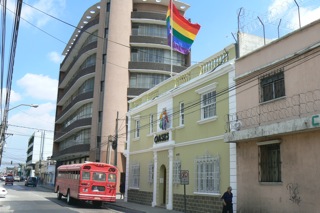
Oasis has an impressive presence, including it’s office building which is a former colonial two-storey mansion on Avenida 3, near city center in Zone 1.
A visitor can’t miss the large rainbow flag waving proudly overhead and the artistically designed name sign over the gated front door. (Virtually every window and door in Central America has bars or fancy wrought iron on it.) (photo right)
Vinicio greeted us and gave us a tour. Started in 1993 as an HIV prevention group by Jorge Lopez, Ruben Mayorga and Mario Andrade, there are now fifteen paid staff and a budget that is supported the Dutch government. Immediately inside the entry are several roll-up posters with real faces and human rights slogans that are used for public presentations, which happen in 24 locations throughout the country including indigenous northern areas.
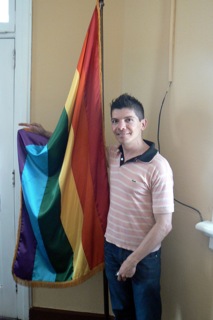
Virtually all HIV outreach programs are supported by foreign NGOs as the Guatemalan government does little to provide education, counseling, testing or treatment for HIV and other health issues. (photo left, Vinicio)
As we were being shown around the various offices, including a central dining room, I noticed a quiet middle-age man watching TV in plain clothes with apparently not much to do, unlike other busy staff. “He’s a policeman,” said Vinicio. “We have protection here 24 hours a day.”
This was a first for me. Homophobia is thick throughout Central America but the on-site presence of an armed policeman (his gun was hidden) further reinforced Jorge’s description of Guatemala as an aggressively anti-gay country. The policeman was there (as ordered by the Organization of American States, OAS, and paid for by the local police department) as an office guard as well as a personal guard for Jorge who is a very public face of the gay community. When he makes a public appearance such as on TV or at an official function the guard goes with him.
Jorge has been the target of harassment and threats from within the current government as well as discontent individuals who think his outspoken demands for human rights for sex workers is somehow threatening. He was actually kidnapped in 1993 for a short time and later threatened with arrest for his outspoken criticism of a morally corrupt public prosecutor who, in turn, fabricated attempted murder charges against Jorge.
Fortunately, the charges were rejected by a judge. The international human rights community continues to support Oasis in their work, including Amnesty International. Jorge said his position as a Human Rights Defender (an official designation from HRW) has kept him alive.
Also see: Charge Against Jorge, Oasis Commentary, About Oasis, Commentary on being gay in Guatemala
Jorge and Rembrandt
Jorge’s personal life is less dramatic. For six years he and his partner Rembrandt (“he paints my life”) have been a committed couple even though Rembrandt still lives with his family. It’s a common custom in Guatemala to live at home until or even after marriage (most people are poor and communal living makes life affordable).
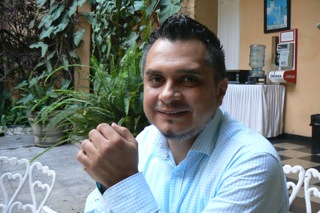 Since Rembrandt, 23, is not out to his family he remains with them. If he were to come out it’s likely he would be out of the house quickly–and not by his choosing. (photo right, Jorge)
Since Rembrandt, 23, is not out to his family he remains with them. If he were to come out it’s likely he would be out of the house quickly–and not by his choosing. (photo right, Jorge)
Jorge’s family is somewhat more open and is cordial toward Rembrandt although not “warm”, he said. He especially misses him at holidays when families traditionally gather and Rembrandt is not included as a close member. But they both understand the rules and adapt around them.
What would be worse, and wholly not accepted, is if Rembrandt were a member of an ethnic indigenous family. Jorge’s family is of proudly ‘pure’ Spanish lineage on both sides of his family—and it goes both ways. Jorge said, “personally I would not care if Rembrandt were mestizo or indian. But Rembrandt would not date me if I weren’t Latino. He’s very strong about that.”
This may partly explain why Oasis lost some members. When it first started it was a middle class LGBT organization. But when Jorge started inviting lower class trans and indigenous gay people to the organization some of the middle class gays disappeared.
Now after 17 years there appears to be a easy-going mix although groups tend to favor like kind, as usual. Apparently sexual orientation doesn’t overcome all barriers among LGBT people. (Money is the great divider, first and last.)
When he was 19, Jorge was pressured into marrying a woman he hardly knew. Needless to say the arrangement fell apart creating stress in his family “but it helped to make me more sure of who I was and was not.” Subsequently he went to the U.S “to be gay and breathe free.”
After a couple of years he felt homesick but, more so, he felt the need to bring to Guatemala what he saw and lived in the States, a healthy and respectful gay life with dignity and rights—not that the States was a bastion of tolerance, but there were pockets of good life, very good life compared to the dark closets of Guatemala.
Work Goes On 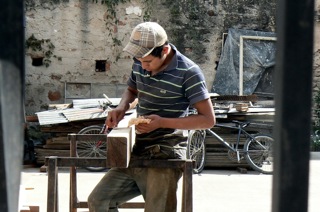
Since then Oasis has been tireless in both organizational matters and outreach support services and is highly respected in the Guatemalan and international LGBT community. In 2004 they received an award from the Nicaraguan government, oddly, for their HIV prevention work. (photo right, local carpenter)
The work goes on to provide social and emotional care to anyone in need. The government is less than helpful in providing HIV medications so Oasis has to find ways around bureaucratic resistance. HIV carries stigma and discrimination, whether one is gay or not. Also see: Demand for Medication Funding
As well, there is active aggression against transsexuals whom Jorge tries to defend—work that has put him in harm’s way. It is thankless work as trannies are a very misunderstood population. Also see: Transvestite Murdered, Transgenders and Gays in Danger
Lesbians
Jorge said there is a group called Lesbidades in Guatemala City who are active but in recent times have shifted away from lesbian issues to feminist concerns. It began in 1995 as a group called Mujeres Somos [We are Women] and is now known by both names.
In a human rights report by Andrew Redling, he wrote, “reflecting the context of repression, Mujeres Somos disguises its identity with a cryptic name. According to one of its leaders, that repression is internalized in the lives of gays and lesbians alike, who “get married and try to live their homosexual lives on the side”.
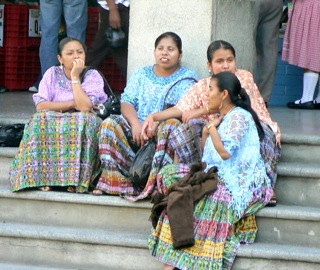
“This is a common enough situation here in Guatemala but it is more difficult for lesbians who are married to men to meet their lovers than it is for gay men who are married simply because men have more power, more control over their own lives than do women. That is, women, unlike men, do not have the cultural permission to come and go as they please.
(photo left, women in traditional dress)
“On the other hand, women in Guatemala have access to spaces with each other that men do not have because women are given more freedom to be close and affectionate with each other. For example, two women can hold hands in public whereas two men cannot. Also, two women can share a bed as friends, but two men cannot.
“Prejudices against lesbians are evident in the widely-expressed societal belief that being lesbian is a choice made by women who are either unable to attract men, or have not experienced sexual intercourse with a “real” man. That makes lesbians particularly vulnerable to rape, by men who cynically claim they are doing the women a favor.”
Venues
Despite the oppressive milieu, there are several LGBT venues in the city such as El Encuentio, Genetic Majestic disco Club, Rouge plus four bars and three saunas, one called Il Colloscum. Jorge complained that most current owners are only interested in money (cover charges and alcohol) and not gay community spirit or rights.
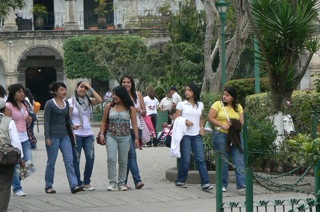
“The gay scene is narrow here; people are expected to be straight so most bars and clubs are straight. The selection of enjoyable non-money-minded gay clubs is limited. The owners have forgotten these places are the only places gay people can be open and feel free for a while. These bars and discos are teaching our young gays that being drunk or taking drugs is the way to be gay.” But then there’s McDonalds that’s become an informal hangout lately. (photo right, women in modern dress)
Indigenous persons, women and trans have virtually no other healthy and safe place to socialize. That leaves Oasis as the only recourse for many LGBT people as a place to ‘breathe free’.
Jorge sees Guatemala as more aggressively homophobic than other Central American country. “It’s the reason many want to emigrate. Simply put there is no legal recourse for gay people here. Our only protection is silence, but is that a way to live?”
Also see: Latin American LGBT Resources, Interview with Jorge, Murder of Oasis Worker Sulma
A Word About Antigua Town
As an antidote to the heated combustion of Guatemala City, Antigua serves well. This colonial town in the mountains, half an hour north, drips and exudes old world charm so thick you can scrape it off with a machete. UNESCO designated it a world heritage site in the 1990s but long before that the indigenous Mayan population knew it as home—not the town we know today but a village.
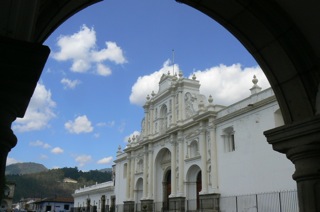
Along came the brutal conquistadors with their tag-along warriors and almost wiped out the natives, known as the Spanish Conquest of the Americas in the 16th century. (It should be noted that the Mayans were not one unified civilization. Each of the major urban centers were city sates and were often at war with each other.)
Skip to today. Somehow a lot of colonial buildings survived– probably by rebuilding several times after the earthquakes that frequent the underground here. The biggest churches, monasteries and cathedral have been a mix of ruin and restoration over the centuries.
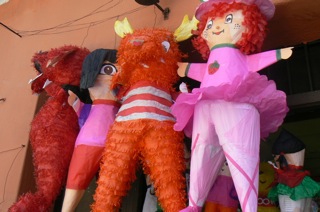
The leafy central square is flooded with locals, tourists and language students during the week. There are dozens of cafes, restaurants, little comedores and curbside cookeries to feed the colorful mix of gringo students, cowboys and colorful Mayans selling handcrafts. (photo right, paper dolls)
DaVinci Restaurant
Along Avenida Norte can be found the gay owned restaurant, DaVinci, dripping old world ambiance. It’s decorated with gilded angels, flickering candelabras, muted paintings, sconce lights with live candles, dark wainscoted ceiling and deep color floor tile. Subdued is clearly the motif.
We were seated at an alcove window table, looking out past a wrought iron lantern to the cobblestone street. It felt as if we’d stepped back in time to an antique European era of decadent elegance as the air was softly suffused with Hispanic chanteuse-style singing. Misplaced but still lovely was the ever-fine Bette Midler singing that old sweet croon tune ‘Wind Beneath My Wings’.
We were greeted and seated by the host-owner Luis Estrada. A gregarious and cheerful man, Luis is unusually tall for a Guatemalan man, well over six feet. He was happy to chat about his two favorite topics, “food and men”.
Talking with Luis revealed a low key gay community in Antigua, with no organization or central focus venue. He has a partner of 11 years. Their many friends are straight and gay and no cares who’s what.
“Every restaurant is gay-friendly here”—including the rowdy Reilly’s bar (easy to check out since the very noisy crowd spills out onto the street with rowdy gringo tourists and students).
A popular place, Luis said, is Frida’s restaurant that draws a mixed crowd among whom are a plentiful presence of lesbians. (Frida Kahlo was a famous bisexual Mexican painter.) You can’t miss it: there are huge paintings of the artist hung about.
At one point he observed the common cliché about macho men, that if they are in the top (power) position, it’s not gay sex. “I will fuck you but I won’t kiss you because I’m not gay,” he said, describing many ‘straight’ men.
I agreed since that was a general comment I’d heard throughout Central America. Then he added another twist to the cliché. “But, not always. If you are in the bed and don’t do anything it’s not really gay sex; I mean if you are on the bed with your ass showing and it happens that you get screwed, it doesn’t mean you actually ‘did’ anything gay, you see? There are many ways a straight gay can fool himself!” Here was another convenient variation on the theme of denial to keep one’s macho self-image.
In a follow-up e-mail, Luis said, “well look, Antigua is a very small town, but very touristic. That means it depends where are the people from, and Europeans are very open people, That’s why there are so many gays here. Normally guys from the big city came in the middle of the week because gay bars are not crowded, and here is fun. Tourists don’t care if it’s Monday or Saturday.

“Sometimes I spend a great time in Reilly’s, but it depends on the customers. If I don’t like that place I walk to La Escudilla, Ricki’s,or MonoLoco. Everything is so close; there are several options. The bars closed at one AM, but after-parties are very fun. (photo right, local boy vendor)
One big thing about here is that people are so friendly, and so many people travel alone. They have to be nice or they can’t speak, you know what I mean.” And the lasagna at DaVinci is divine!
Also see:
Gay Life in Antigua, Guatemala 2012
Gay Guatemala News & Reports 1996 to Present
Guatemala Photo Galleries
Gay Porn Flick Filmed in Antigua
Gay Guatemala Website
Guatemala Gay Life by Richard Stern
HIV Discrimination (pdf)
Guatemala Sex Trade
Americans Working in Guatemala City
Not mentioned in this story is the annual Gay Pride March:
http://gayguatemala.com/articulos/art54.htm
Guatemala Pride March
Gay Marchers Demand Rights




